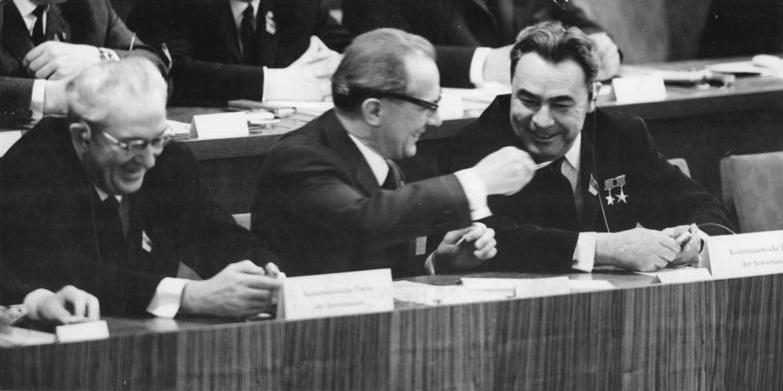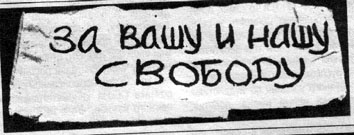|
Larisa Bogoraz
Larisa Iosifovna Bogoraz (russian: Лари́са Ио́сифовна Богора́з(-Брухман), full name: Larisa Iosifovna Bogoraz-Brukhman, Bogoraz was her father's last name, Brukhman her mother's, August 8, 1929 – April 6, 2004) was a dissident in the Soviet Union. Biography Born in Kharkiv, at the time capital of the Ukrainian SSR, to a family of Communist Party bureaucrats, she graduated as a linguist from the University of Kharkiv and in 1950, married her first husband, Yuli Daniel, a writer. Together, they moved to Moscow. Her marriage to Daniel would ultimately lead to her becoming involved in activism. In 1965, Daniel and a friend of his, Andrei Sinyavsky, were arrested for a number of writings that they had had published overseas under pseudonyms (see Sinyavsky-Daniel trial). The trial of the two men was the beginning of a crackdown on dissent under General Secretary Leonid Brezhnev. They were both sent to terms in forced labor camps. After their d ... [...More Info...] [...Related Items...] OR: [Wikipedia] [Google] [Baidu] |
Kharkiv
Kharkiv ( uk, wikt:Харків, Ха́рків, ), also known as Kharkov (russian: Харькoв, ), is the second-largest List of cities in Ukraine, city and List of hromadas of Ukraine, municipality in Ukraine.Kharkiv "never had eastern-western conflicts" ''Euronews'' (23 October 2014) Located in the northeast of the country, it is the largest city of the historic Sloboda Ukraine, Slobozhanshchyna region. Kharkiv is the administrative centre of Kharkiv Oblast and of the surrounding Kharkiv Raion. The latest population is Kharkiv was founded in 1654 as Kharkiv fortress, and after these humble beginnings, it grew to be a major centre of industry, trade and Ukrainian culture in the Russian Empire. At the beginning of the 20th century, ... [...More Info...] [...Related Items...] OR: [Wikipedia] [Google] [Baidu] |
Dissolution Of The Soviet Union
The dissolution of the Soviet Union, also negatively connoted as rus, Разва́л Сове́тского Сою́за, r=Razvál Sovétskogo Soyúza, ''Ruining of the Soviet Union''. was the process of internal disintegration within the Soviet Union (USSR) which resulted in the end of the country's and its federal government's existence as a sovereign state, thereby resulting in its constituent republics gaining full sovereignty on 26 December 1991. It brought an end to General Secretary Mikhail Gorbachev's (later also President) effort to reform the Soviet political and economic system in an attempt to stop a period of political stalemate and economic backslide. The Soviet Union had experienced internal stagnation and ethnic separatism. Although highly centralized until its final years, the country was made up of fifteen top-level republics that served as homelands for different ethnicities. By late 1991, amid a catastrophic political crisis, with several republics alre ... [...More Info...] [...Related Items...] OR: [Wikipedia] [Google] [Baidu] |
Zvezda (magazine)
''Zvezda'' (russian: links=no, Звезда, lit=star) is a Russian literary magazine published in Saint Petersburg since 1924. It began as a bimonthly, but has been monthly since 1927. History The first issue of ''Zvezda'' appeared in January 1924, with Ivan Maisky as editor-in-chief. Katerina Clark writes, in a discussion of the new journals founded at this time: Unlike Moscow, Petrograd was given only one "thick" journal, the ''Star'' (Zvezda), which was less important and had a smaller circulation than its Moscow counterparts, which were thus able to lure away the more successful or acceptable Petrograd writers.... vezdafunctioned as a medium through which fringe figures on the left (proletarian extremists) and the right (such as Pilnyak, Pasternak, and Mandelshtam) could publish. While this situation afforded Petrograd the role of the more honorable, less compromised city, to some it seemed the town of the has-beens.Katerina Clark, ''Petersburg: Crucible of Cultural Rev ... [...More Info...] [...Related Items...] OR: [Wikipedia] [Google] [Baidu] |
Hunger Strike
A hunger strike is a method of non-violent resistance in which participants fast as an act of political protest, or to provoke a feeling of guilt in others, usually with the objective to achieve a specific goal, such as a policy change. Most hunger strikers will take liquids but not solid food. In cases where an entity (usually the state) has or is able to obtain custody of the hunger striker (such as a prisoner), the hunger strike is often terminated by the custodial entity through the use of force-feeding. Early history Fasting was used as a method of protesting injustice in pre-Christian Ireland, where it was known as ''Troscadh'' or ''Cealachan''. Detailed in the contemporary civic codes, it had specific rules by which it could be used. The fast was often carried out on the doorstep of the home of the offender. Scholars speculate that this was due to the high importance the culture placed on hospitality. Allowing a person to die at one's doorstep, for a wrong of which o ... [...More Info...] [...Related Items...] OR: [Wikipedia] [Google] [Baidu] |
Mikhail Gorbachev
Mikhail Sergeyevich Gorbachev (2 March 1931 – 30 August 2022) was a Soviet politician who served as the 8th and final leader of the Soviet Union from 1985 to dissolution of the Soviet Union, the country's dissolution in 1991. He served as General Secretary of the Communist Party of the Soviet Union from 1985 and additionally as head of state beginning in 1988, as Chairman of the Presidium of the Supreme Soviet from 1988 to 1989, Chairman of the Supreme Soviet from 1989 to 1990 and the only President of the Soviet Union from 1990 to 1991. Ideologically, Gorbachev initially adhered to Marxism–Leninism but moved towards social democracy by the early 1990s. Gorbachev was born in Privolnoye, Stavropol Krai, Privolnoye, Russian Soviet Federative Socialist Republic, Russian SFSR, to a poor peasant family of Russian and Ukrainian heritage. Growing up under the rule of Joseph Stalin, in his youth he operated combine harvesters on a Collective farming, collective farm before join ... [...More Info...] [...Related Items...] OR: [Wikipedia] [Google] [Baidu] |
Yuri Andropov
Yuri Vladimirovich Andropov (– 9 February 1984) was the sixth paramount leader of the Soviet Union and the fourth General Secretary of the Communist Party of the Soviet Union. After Leonid Brezhnev's 18-year rule, Andropov served in the post from November 1982 until his death in February 1984. Earlier in his career, Andropov served as the Soviet ambassador to Hungary from 1954 to 1957, during which time he was involved in the suppression of the 1956 Hungarian Uprising. He was named chairman of the KGB on 10 May 1967. In this position, he oversaw a massive crackdown on dissent carried out via mass arrests and involuntary psychiatric commitment of people deemed "socially undesirable". After Brezhnev suffered a stroke in 1975 that impaired his ability to govern, Andropov effectively dominated policy-making alongside Foreign Minister Andrei Gromyko, Defense Minister Andrei Grechko and Grechko's successor, Marshal Dmitry Ustinov, for the rest of Brezhnev's rule. Upon Brezhnev ... [...More Info...] [...Related Items...] OR: [Wikipedia] [Google] [Baidu] |
Vasili Mitrokhin
Vasili Nikitich Mitrokhin (russian: link=no, Васи́лий Ники́тич Митро́хин; March 3, 1922 – January 23, 2004) was a major and senior archivist for the Soviet Union's foreign intelligence service, the First Chief Directorate of the KGB, who defected to the United Kingdom in 1992 after providing the British embassy in Riga with a vast collection of his notes purporting to be written copies of KGB files. These became known as the Mitrokhin Archives. The intelligence files given by Mitrokhin to the MI6 exposed an unknown number of Soviet agents, including Melita Norwood. He was co-author with Christopher Andrew of ''The Mitrokhin Archive: The KGB in Europe and the West'', a massive account of Soviet intelligence operations based on copies of material from the archive. The second volume, ''The Mitrokhin Archive II: The KGB in the World'', was published in 2005, soon after Mitrokhin's death. Education Mitrokhin was born in Yurasovo, in Central Russia, R ... [...More Info...] [...Related Items...] OR: [Wikipedia] [Google] [Baidu] |
Christopher Andrew (historian)
Christopher Maurice Andrew, (born 23 July 1941) is an Emeritus Professor of Modern and Contemporary History at the University of Cambridge with an interest in international relations and in particular the history of intelligence services. Andrew is Professor of Modern and Contemporary History, former Chair of the History Faculty at Cambridge University, Official Historian of the Security Service (MI5), Honorary Air Commodore of 7006 (VR) Intelligence Squadron in the Royal Auxiliary Air Force, Chairman of the Cambridge Intelligence Seminar, and former Visiting Professor at Harvard, Toronto and Canberra. Andrew served as co-editor of ''Intelligence and National Security'', and a presenter of BBC radio and TV documentaries, including the Radio Four series ''What If?''. His twelve previous books include a number of studies on the use and abuse of secret intelligence in modern history. Life He is currently a governor of Norwich School where in the 1950s he was a pupil, and has r ... [...More Info...] [...Related Items...] OR: [Wikipedia] [Google] [Baidu] |
Vadim Delaunay
Vadim Nikolaevich Delaunay ( rus, Вади́м Никола́евич Делоне́, p=vɐˈdʲim nʲɪkɐˈlajɪvʲɪtɕ dʲɪlɐˈnʲɛ, a=Vadim Nikolayevich Dyelonye.ru.vorb.oga; December 22, 1947, Moscow – June 13, 1983, Paris) was a Soviet poet and dissident, who participated in the 1968 Red Square demonstration of protest against military suppression of the Prague Spring. Biography Delaunay was born to a Russian-French family of Soviet Intelligentsia. He was the son of Nikolai Borisovich Delone, a Soviet physicist. His grandfather, Boris Delaunay, was a prominent Soviet mathematician and creator of the Delaunay triangulation. Among his ancestors was marquis Bernard-René de Launay, the last governor of the Bastille, murdered by the attackers on that castle. Delaunay studied at Moscow matshkola ("Mathematical School") No. 2, one of the best in the country at that time, then at the Department of Philology at the Moscow Pedagogical Institute. As a student, he also work ... [...More Info...] [...Related Items...] OR: [Wikipedia] [Google] [Baidu] |
Natalya Gorbanevskaya
Natalya Yevgenyevna Gorbanevskaya ( rus, Ната́лья Евге́ньевна Горбане́вская, p=nɐˈtalʲjə jɪvˈɡʲenʲjɪvnə ɡərbɐˈnʲefskəjə, a=Natal'ya Yevgen'yevna Gorbanyevskaya.ru.vorb.oga; 26 May 1936 – 29 November 2013) was a Russian poet, a translator of Polish literature and a civil-rights activist. She was one of the founders and the first editor of ''A Chronicle of Current Events'' (1968–1982). On 25 August 1968, with seven others, she took part in the 1968 Red Square demonstration against the Soviet invasion of Czechoslovakia. In 1970 a Soviet court sentenced Gorbanevskaya to incarceration in a psychiatric hospital. She was released from the Kazan Special Psychiatric Hospital in 1972, and emigrated from the USSR in 1975, settling in France. In 2005, she became a citizen of Poland. Life in Moscow Gorbanevskaya was born in Moscow. She graduated from Leningrad University in 1964 and became a technical editor and translator. Only nine of ... [...More Info...] [...Related Items...] OR: [Wikipedia] [Google] [Baidu] |
Pavel Litvinov
Pavel Mikhailovich Litvinov (russian: Па́вел Миха́йлович Литви́нов; born 6 July 1940) is a Russian-born U.S. physicist, writer, teacher, human rights activist and former Soviet-era dissident. Biography The grandson of Ivy Low and Maxim Litvinov, Joseph Stalin's foreign minister during the 1930s, Pavel Litvinov was raised amongst the Soviet elite. As a schoolboy, he was devoted to the cult of Stalin, and was tapped, unsuccessfully, by the KGB to report on his parents Flora and Misha Litvinov (a story that is related by the journalist David Remnick in his book '' Lenin's Tomb''). After the death of Joseph Stalin in 1953 and the return of family friends from the labor camps, Pavel grew disillusioned with the Soviet system. He had a short-lived marriage when he was 17. While in his 20s, he became a physics teacher at the Institute for Chemical Technology. During his time at the Institute, Litvinov became acquainted with a group of intellectuals who were fo ... [...More Info...] [...Related Items...] OR: [Wikipedia] [Google] [Baidu] |

.jpg)



